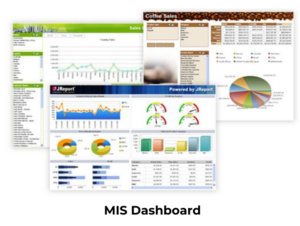
Management Information System – MIS
As the name suggests MIS is a System to highlight specific Information pertaining to key performance areas to the Management. Every organization’s key goal is to improve profitability & sustain itself in the long run. Since the organization operates in a dynamic environment involving risks & uncertainties there is a need to periodically monitor multiple functions within the organization to ensure that they are optimized and contribute to their full potential to achieve the organizational goal.
Thus MIS is a set of procedures that provides essential data and information to the management for making an informed decision and therefore a link between information-gathering and decision-making.
While MIS is a given and an established tool for management process in a Medium or a Large Enterprise, its use or efficacy is lacking in many Micro or Small Enterprises (MSE’s).
 While MIS may sound too complex for an MSE’s entrepreneur to have, in reality, it is mostly a collation of comparative data from within their own business and represented in a tabular or graphic form.
While MIS may sound too complex for an MSE’s entrepreneur to have, in reality, it is mostly a collation of comparative data from within their own business and represented in a tabular or graphic form.
This format of presenting information is very useful, especially for an MSE entrepreneur, since they tend to get lost in the accounting jargon when they are presented with their business data in standard accounting format, as it has too much detail.
MIS enables & allows an entrepreneur to monitor Key Performance Areas (KPA’s) of his business and react more quickly and efficiently to changes in the market that affect his business.
Advantages of MIS and reporting
a) Helps manage data
Critical information gets stored in an organized manner enabling quick access whenever required. Thus, MIS helps to maintain and manage business data for use in decision making by the management.
b) Analyse trends
Every business needs to create a strategy for growth. It is therefore essential to have accurate data on current market conditions and trend. MIS makes use of analytical tools to process the internal data, market reports and future trends for accurately forecasting the future.
c) Helps in strategic planning
As stated above MIS reports play an important role in forecasting the future. It also helps to identify the resources that will form a part of the strategic plan to accomplish future business objectives. Here, the accuracy & reliability of the information provided by MIS Report is critical.
d) Helps in goal setting
Goal setting is critical to drive the growth and ensuring the success of any business enterprise in the future. Preparation of a Business Plan is an important goal setting exercise. It requires a lot of current data and trend analysis which is provided by MIS Reports.
e) Helps identify problems
MIS report provides critical information related to every aspect of activity of a business. Hence, in case of any problem, MIS reports help to identify the source of the problem and also aids in finding a solution to such an issue.
f) Improves efficiency
MIS Reports also help in assessing & monitoring the performance of the business. Thus, MIS plays a vital role in increasing the efficiency of the business.
g) Helps compare the performance
The relevant data and information of the business are stored and maintained as a part of the MIS database. This database can be accessed to compare the current performance with the previous year’s achievement to measure the growth.
Preparing an MIS Report
MIS Reports are prepared as per the requirements of the business and the needs of the decision-makers.
Some companies want the MIS to be brief highlighting only the KPA’s and presented in a graphical or Dashboard format, while others want it to cover all the functions of the business.
The best way for an entrepreneur to arrive at a format, is to discuss with the management team regarding their preference and areas that are critical to his business. However, make sure it covers only that information which is relevant to most of them.
Let us check out a few Reports that can be covered in the Management Dashboard:
1) Budget:
Business Plan is a quantified version of the entrepreneur vision of his business in the future and an important goal setting exercise. A budget, on the other hand, is a document that is prepared to estimate the revenues and expenses for an upcoming period based on the goals set in the Business Plan. It is a critical MIS tool and includes income and expenditure budget, production budgets, cash budgets etc.
2) Sales Report:
This is a complete sales analysis of different products sold by the company in different geographical areas. It may show the variance between budgeted v/s actual Sales with reasons.
3) Cash flow statements:
This statement indicates the amount of cash inflows and cash outflow during the period of operations. It also indicates the sources & utilization along with opening & closing cash & bank balances of the enterprise.
4) Funds flow statements:
This statement is prepared to indicate various sources of funds as well as their application areas during any period.
5) Budgeted and actual profit report:
This report clearly points out the budgeted and actual profit of the company during a specified period. It also states the reasons which have accounted for any increase or decrease in the actual profit.
6) Report on financial statements:
Profit & Loss Account and Balance Sheet are important sources of sharing financial information not only with the entrepreneur or shareholders but also with government departments and other stakeholders like banks, regulatory authorities, etc.
7) Cost reports:
These reports cover several types of information with respect to the specific cost incurred by a specific function or department of the business, for example, production cost report, departmental cost report etc.
8) Production Report:
This report states the production targets achieved and highlight the variation between budgeted v/s actual production.
9) Machine utilisation report:
This report is prepared in a manufacturing company and indicates the extent to which the productive capacity of a machine is used during a specified period of time. It gives the details of the utilization of a machine for various jobs and duration for which it remained idle or was under planned maintenance.
10) Report on idle time:
This report is prepared in a manufacturing company and indicates the time actually spent by the workers on different jobs and the time for which they were sitting idle due to wanting of material, electricity or any other resource.
11) Orders in hand report:
This report is prepared to indicate the orders received by the company in respect of each of its products or services along with the ratio of orders in hand to production capacity or projected annual sales.
MIS can be designed to generate many other reports and statements besides those mentioned above. They may cover key business areas like human resources, production, finance, working capital, administration, etc.
Services offered by CFO Services LLP for MSME’s
MSME’s are important for the Indian economy to scale the $5 trillion mark. However, this will not be achieved just by adding more MSME’s, but by MSME’s themselves ensuring that they have vision and strategy in place for their growth along with the size of the Indian economy.
Large & Medium corporates invest large sums in systems and for employing experienced & talented senior business executives to ensure that they stay focused, track their progress and make periodic assessments to ensure that the actual achievements are in line with their Plan. Unfortunately, MSE’s find these costs prohibitive and hence despite best efforts miss out on the desired results.
If having an experienced CFO, ERP Systems, trained and updated Accounting Staff & other infrastructure is the whole cake that an MSE cannot afford, then CFO Services LLP enables the MSE to make a cost-effective choice and pick up only that slice (services) which their business requires the most.
For effective MIS in an MSE, CFO Services handholds the entrepreneur and does not just advice but ensures effective delivery. The process starts with

– Article by Rajesh Koundinya
